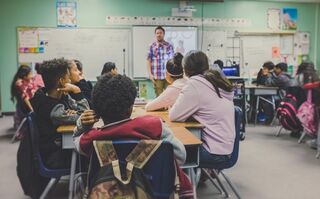Environment
The Importance of Social Cohesion
Beyond feeling nice, why is a sense of connectedness so crucial?
Posted November 13, 2021 Reviewed by Ekua Hagan
Key points
- Research indicates that echo chambers leads to the development of more extreme viewpoints.
- Studies suggest that students who study in mixed socioeconomic classrooms develop more empathy.
- History indicates that when the stakes are high, familiarity with dissimilar others helps prevent dehumanization.
This is part 3 of a 4-part series on how brands drive social cohesion, connectedness, and community through shared consumer experiences.
In part 1, we saw how the economic divide has narrowed the opportunity for shared consumer experiences. In part 2, we saw how this manifests both with in-person retail experiences and in the digital world. There’s a crucial question that has gone unanswered: Why is it important to have shared experiences?
For one, they help us avoid social "echo chambers" in which people interact with groups of people we already agree with. Whether online or in real life, this homogeneity has a way of limiting our perspective and distorting our worldviews - similar to how we respond to digital personalization.
Research has found that these types of interactions make existing beliefs more ingrained, extreme, and emboldened. Author and Law Professor Cass Sunstein has done several empirical investigations on this phenomenon within the arena of political psychology. What happens when you put a group of people in the same room who are all moderately against an increase in the minimum wage?

After deliberating about this amongst themselves, the group becomes even more opposed to increasing the minimum wage. People who favor stricter gun regulations want even stricter gun control laws; people who believe that global warming is a serious problem come to insist on more severe measures to prevent global warming. And so on. These echo chambers can lead to extremism.
As Sunstein remarks, "In a striking empirical regularity, deliberation tends to move groups and the individuals who compose them toward a more extreme point in the direction indicated by their own pre-deliberation judgments." People become more entrenched in their existing beliefs and more intolerant towards different viewpoints.
Echo Chambers and the Importance of Shared Experiences
And the more siloed online communities become, the greater the risk they develop, and become entrenched within, their own epistemic universes. This is compounded by influencer culture's impact on The American Dream. Put simply, a lack of shared experiences and interactions dissolve a shared interpretation of reality.
In contrast, research has found that having shared experiences with different people leads to more generosity, social cohesion, and greater prosociality.
Stanford Professor Sean Reardon studies the impact of poverty and inequality on education. In an interview cited in The Velvet Economy, he remarks that "Most families increasingly live in neighborhoods that are more homogenous economically than they were in the past. When children are raised in uniformly wealthy enclaves, it may limit their understanding and empathy for the life experiences of most of America. When we don't have empathy, it makes it harder to feel like we have shared problems in society. It's easy to feel like those are someone else's problems." (pg. 280)
To Reardon's point, a growing body of research supports the benefits of economic heterogeneity in education. In an academic paper appropriately titled, "Familiarity does not breed contempt," Gautam Rao examined the impact of mixing students of socioeconomic background in elementary schools in New Delhi.

The impact on affluent students was clear: They were much less likely to discriminate against poorer students, and instead, were much more willing to socialize with them. Even more impressive, the rich students were also more prosocial, egalitarian, and generous, in general. In sum, exposure was positive for the entire community, for both rich and poor students.
Research finds that direct interaction with diverse groups changes how we see ethnic categories. For example, the more experience one has, the greater the tendency to see other ethnicities as more similar to one another. And along those lines, these experiences lead people to judge different ethnicities as being more similar in their warmth and competence. In contrast, only interacting with people from one’s own ethnic background leads people to see ethnic groups as being very distinct, with each group receiving different rankings on warmth and competence.
One compelling way to view these results is that interacting with a broad range of people leads to the recognition of underlying, common humanity. The more experience we have of one another, the more similar we feel.
Social Cohesion Under Pressure
When the stakes are high enough, exposure to different people is a matter of life and death. Consider the following example from one of humanity's darkest periods, the Holocaust.

Amidst the unspeakable evils, there emerged a ray of human triumph. Thousands of non-Jewish Europeans risked their lives and the lives of their family members to save Jewish people from persecution. The stakes could not have been higher. Those who were found out met a similar fate as the people they were trying to protect.
Decades later, sociologists, Samuel and Pearl Oliner studied these cases. Why did some people dehumanize their fellow humans while others risked everything to save them? The Jewish rescuers proved to be an incredibly diverse group, consisting of men and women, rich and poor, educated and uneducated. Superficially, they were an eclectic group. But what they found was a remarkably consistent throughline in their experience and upbringing: They all had close interactions with Jewish people, as neighbors, colleagues, or as close childhood friends.
A little social cohesion can go a long way. Connecting with our fellow humans is part and parcel of human nature.
Where can we go from here? There may exist an unlikely source of social cohesion, addressed in the 4th and final piece: corporations.
This post also appears on the human nature blog Neuroscience Of.
References
Bai, X., Ramos, M. R., & Fiske, S. T. (2020). As diversity increases, people paradoxically perceive social groups as more similar. Proceedings of the National Academy of Sciences, 117(23), 12741-12749.
Kozol, J. (2012). Savage inequalities: Children in America's schools. Crown.
Rao, G. 2019. "Familiarity Does Not Breed Contempt: Generosity, Discrimination, and Diversity in Delhi Schools." American Economic Review, 109 (3): 774-809.
Restless Memories: Recollections of the Holocaust Years (Berkeley, CA: Judah L. Magnes Museum, 1979, 1986)
Urban, C. (Jan, 2019) Normal Rockwell Meets Andy Warhol, MassLive Entertainment




